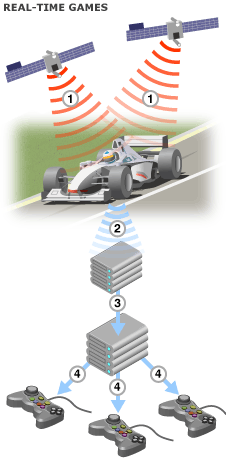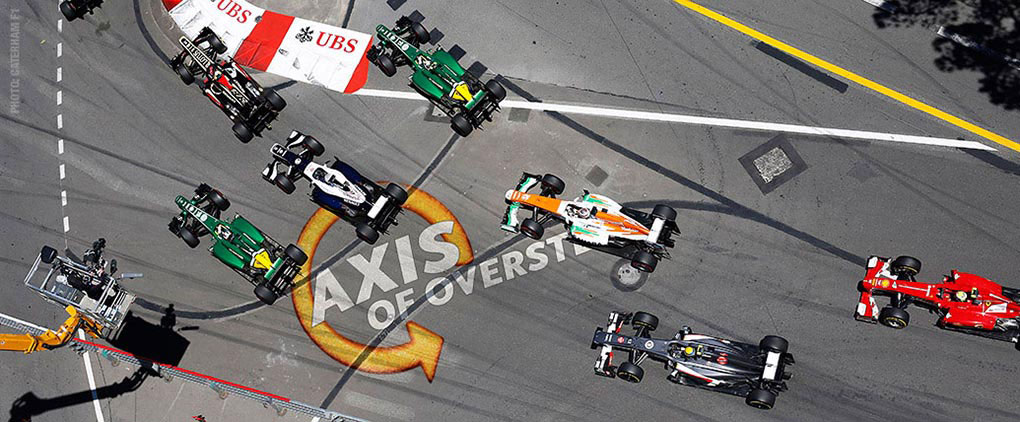 Alonso pushed me on the grass and finally Fisichella broke my wing... these could be your post race excuses in the near future....
Alonso pushed me on the grass and finally Fisichella broke my wing... these could be your post race excuses in the near future....Imagine measuring your skills, ok virtual skills, with real drivers, in real time, using real telemetry data from the circuit as it happens? how cool would that be?
Virtual racing is now so popular that web sites write race recaps in full realistic style, a next possible step for the hardcore sim driver is suggested out in this BBC article sent to us by one of our readers, Antonio Gonella:
Real racing in the virtual world
By Jonathan Fildes
Science and technology reporter, BBC News
Sat on the start grid, foot poised over the accelerator, you wait for the row of red lights to extinguish. Alongside you are top names like Lewis Hamilton, Felipe Massa and Kimi Raikkonen. The cars' engines are screaming and everyone is poised to go. For any Formula One fan the chance to race against their heroes would be a dream come true.
Sadly, the closest most of us have ever got is watching the Grand Prix on television. But that could soon change if a company from the Netherlands has its way.
"It's clear that the next trend in gaming is going to be bringing real objects into the virtual world; playing not against other gamers but people doing the real thing," said Andy Lurling, founder of iOpener Media.
The patented system his company is developing sucks in real-time GPS data from racing events and pumps it out to compatible games consoles and PCs.
The idea is that you could pit yourself against the top drivers in the world, as it happens, from the comfort of your living room.
"You can compete against the best of the best," he told BBC News. 'Hardcore appeal'
And if all of this sounds far fetched, think again.
The European Space Agency (Esa) was so impressed with his proposal, it gave Mr Lurling's company a grant to develop a proof of concept. A German venture capitalist has stumped up cash to develop it further.
He has already tested it with an F1 car and plans to have the first games on the market as early as September this year.
"At this point we have lots of interest and we are looking for the right partner to launch," he said. The firm is currently in talks with six developers about using the technology. Gareth Wilson, design manager at Bizarre Creations, makers of the Project Gotham Racing series, says he thinks games with the real-time feature would "excite a hardcore minority of gamers".
"Formula 1 and similar complex simulation games are getting less mass market nowadays, compared to their more arcade-style heyday in the late 90s," he told BBC News.
"This sort of feature would probably appeal to the hardcore gamer or F1 fan more than a mass market gamer. "Having said that, the hardcore would totally love it."
Bizarre Creations is not currently one of the firms evaluating the system.
At the core of iOpener's technology is an enhanced GPS system known as differential GPS (DGPS). This uses a network of fixed base stations to correct the GPS signal, which on its own may only be accurate to within 10m. DGPS is commonly used for air navigation or shipping where precision is key.
 1. Car position located with Global Navigation Satellite Systems
1. Car position located with Global Navigation Satellite Systems2. Location data and car telemetry is beamed to a track side server
3. Data is tagged with unique ID of the car and sent over the internet
4. Information stored on servers and "mediacast" to gamers.
Whole process from car to gamer takes less than five seconds "With that we know the location and the velocity of the car," explained Mr Lurling.
As further precision is needed, iOpener can use information from the European EGNOS network, which augments GPS satellite signals to provide positional data accurate to within 2m.
Other tweaks include fitting cars with an inertial measurement unit (IMU), commonly used in guided missile systems, which measure acceleration, angle and yaw of the object.
"IMUs give accuracy on a short range," Mr Lurling told BBC News. "Combined with DGPS, we know the location of the car to within less than 30 centimetres."
In addition, the system collects telemetry data from the car, which is fitted with a small computer, transmitter and the GPS receiver.
"That is already good enough data for a game," he said. Telemetry is commonly collected by track-side engineers to monitor the vehicles' performance and can include information such as acceleration and what gear the car is in. It has already used by games developers to build more realistic simulations.
Designers at Bizarre Creations used the telemetry to generate accurate track models for early F1 games, before detailed circuit maps existed, for example.
From the track side, the data is sent over the net to a server farm, where it is saved before being pumped out - or "mediacast" - to eager gamers.
The delay between collecting the data and the gamer being immersed in it is up to five seconds, similar to the lag on a TV broadcast.
"We also store the data, so not only can you play the game in real time, but you can replay races at a later date," said Mr Lurling.
Intelligent gaming
The company does not intend to develop its own games; rather it will provide the backbone for games developers to build on to.
But it will provide some software; specifically an artificial intelligence (AI) program to make sure that the virtual and real worlds blend seamlessly.
Artificial intelligence handles collisions between real and virtual drivers
"If Hamilton is driving behind you he can't see you [in the game], so he would drive right through you," explained Mr Lurling.
"So the AI takes over at that point and you see a very realistic overtaking."
The system also handles the results of in-game collisions between real and virtual drivers.
In this case, the real car always drives away. The gamer's fate is less certain.
"We go for optimal realism but the game experience has to be right," he said.
Mr Wilson agrees with this approach.
"There is a huge difference between what happens in the real world and what happens in video games - even the most 'realistic' simulator has to bend real world physics to make the game more fun," he said.
However, even with the AI, he thinks gamers may encounter a more fundamental frustration with the system.
"I know I wouldn't even get close to the lap times that Lewis Hamilton could run, unless my car in the virtual world had a load of extra grip and power - which might defeat the point," he said.
At the moment, iOpener is concentrating firmly on racing games, but believes that there is a huge market for the system in other sports.
"You can think of biking, rowing, skiing and snowboarding," said Mr Lurling.
"In the next three to five years, we believe that games will not be 'triple A' games unless they have our feature in," he said.
Mr Lurling was the 2006 Dutch regional winner of the European Satellite Navigation Competition (Galileo Masters) which aims to find novel uses for location data. The 2008 competition is now open to entries, until 31 July."

No comments:
Post a Comment